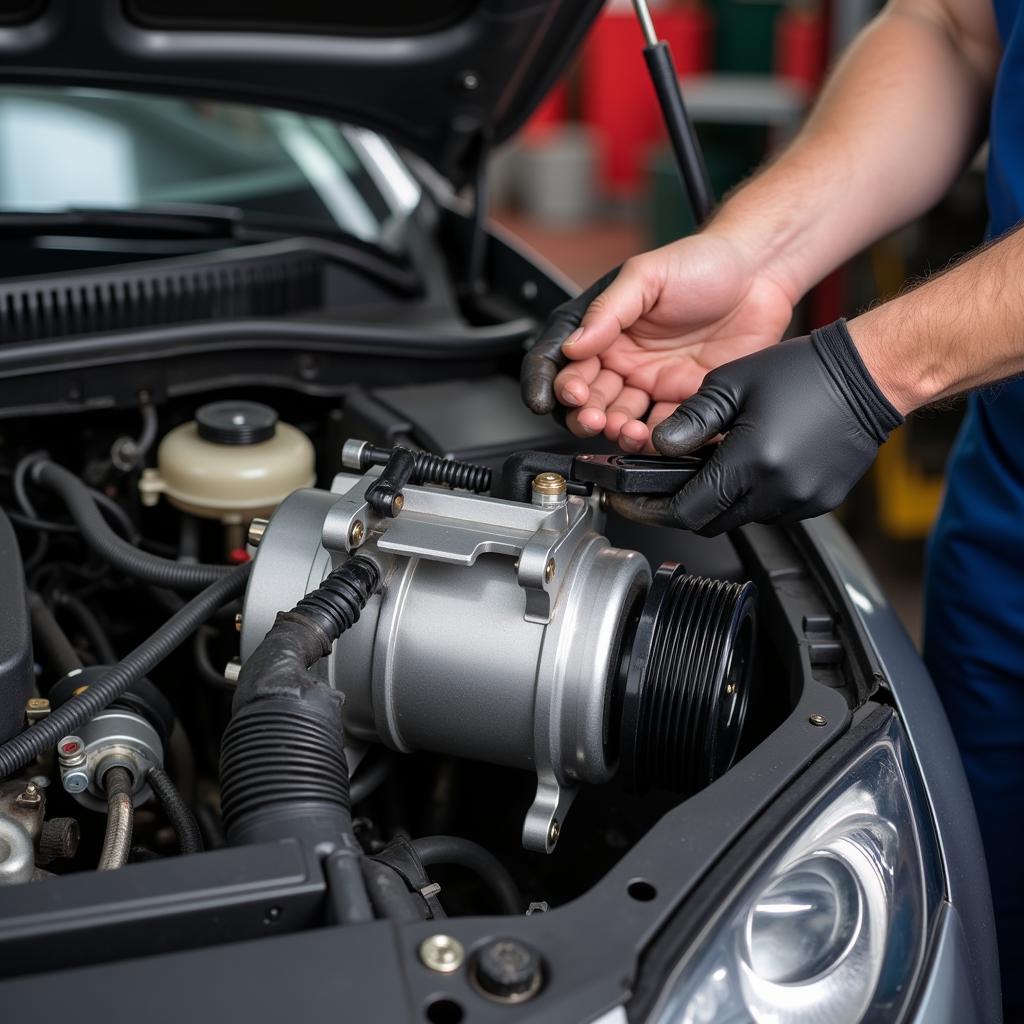Trying to beat the heat but your car AC is blowing hot air? A broken car AC system is a frustrating experience, and figuring out the cost to fix it can feel like navigating a maze. Don’t sweat it! We’re here to break down the factors influencing car AC repair costs and give you a clear picture of what to expect. Whether you’re a car owner, mechanic, or just car-savvy, this guide will equip you with the knowledge to make informed decisions about your car’s AC system.
[how much does it cost to fix car ac leak](https://autotippro.com/how much does it cost to fix car ac leak/)
Common Car AC Problems and Their Costs
Understanding the potential culprits behind your AC woes can give you a better grasp of the potential repair costs. Here are some common car AC issues:
1. Refrigerant Leak: One of the most frequent issues is a refrigerant leak.
Symptoms include a gradual loss of cooling power and a hissing sound. Costs to fix this can range from $150 to $800, depending on the leak’s severity and location.
2. Compressor Failure: The compressor is the heart of your AC system, and its failure can be a significant expense, ranging from $400 to $1200 for replacement.
 Mechanic replacing a car AC compressor
Mechanic replacing a car AC compressor
3. Condenser Problems: Located at the front of your car, the condenser can become clogged with debris or damaged, costing between $150 to $400 to replace.
4. Evaporator Issues: Tucked away in the dashboard, the evaporator can develop leaks, leading to a sweet smell and reduced cooling. Repairing or replacing it can range from $500 to $1500 due to the labor-intensive nature of accessing it.
5. Electrical Problems: Malfunctioning sensors, switches, or blown fuses can also disrupt your AC system. These electrical gremlins can cost anywhere from $100 to $400 to diagnose and repair.
Factors Affecting Car AC Repair Cost
“How much fix ac car?” is a question with a lot of variables. Several factors beyond the actual problem can impact your final bill:
-
Car Make and Model: Luxury or rare vehicles often come with more expensive parts and specialized labor costs.
-
Labor Rates: Mechanic shops in different areas or with varying expertise can have different hourly rates.
-
Repair Shop Type: Dealerships often charge a premium compared to independent mechanics.
-
Parts Quality: Opting for OEM (Original Equipment Manufacturer) parts might be pricier upfront but can offer better longevity and performance compared to aftermarket options.
How to Save Money on Car AC Repair
[how much cost to fix car ac](https://autotippro.com/how much cost to fix car ac/)
Nobody likes an unexpected expense. Here are some tips to potentially reduce your car AC repair costs:
-
Regular Maintenance: Just like any other system in your car, preventative maintenance can save you money in the long run. Have your AC system inspected and serviced annually, preferably before the summer heat arrives.
-
Shop Around: Don’t settle for the first quote you get. Call multiple repair shops to compare prices for both parts and labor.
-
Ask About Warranty: Some repairs and parts come with warranties. Be sure to inquire about coverage periods and what they entail.
[how much does it cost to fix my car ac](https://autotippro.com/how much does it cost to fix my car ac/)
- Consider DIY for Minor Issues: If you’re mechanically inclined, some minor AC issues like recharging the refrigerant or replacing a cabin air filter can be tackled at home. However, for more complex problems, it’s always best to consult a professional.
When to Seek Professional Help
While DIY can be tempting, certain car AC problems require the expertise of trained technicians:
-
Complex System Issues: Problems with the compressor, condenser, or evaporator often involve specialized tools and knowledge best handled by professionals.
-
Safety Concerns: The AC system operates under high pressure. Tampering with it without proper training can be dangerous.
-
Electronic Diagnostics: Modern car AC systems often require computerized diagnostic equipment to pinpoint issues accurately, which most car owners don’t have access to.
Keeping Your Cool on the Road
Experiencing a car AC breakdown can be inconvenient, but understanding the potential costs and ways to save can empower you to make informed decisions. Remember, regular maintenance and proactive care are key to keeping your car’s AC system running smoothly and avoiding those sweltering summer drives.
Need help with your car’s AC system? Don’t hesitate to contact the experts at AutoTipPro for reliable and affordable service. Give us a call at +1 (641) 206-8880 or visit our office at 500 N St Mary’s St, San Antonio, TX 78205, United States.
FAQs
1. How often should I recharge my car’s AC?
Ideally, your car’s AC system shouldn’t require frequent recharges. If you find yourself needing to recharge it every year, it likely indicates a leak that needs professional attention.
2. Can I use a DIY AC recharge kit?
While DIY recharge kits are available, it’s crucial to use them with caution. Overcharging the system can cause damage. If you’re unsure, consult a mechanic.
3. Why does my car AC smell bad when I turn it on?
A musty odor usually suggests mold or bacteria buildup on the evaporator. This often occurs when moisture isn’t properly drained.
4. Can I drive my car with a broken AC compressor?
While it’s not mechanically impossible to drive with a broken AC compressor, it’s not recommended. The compressor is connected to the engine’s serpentine belt, and a seized compressor can cause the belt to break, leading to more significant engine problems.
5. How long does a car AC repair typically take?
The repair time varies greatly depending on the issue. Simple repairs like a refrigerant recharge might take an hour, while more involved repairs like a compressor replacement could take several hours or even a full day.






Leave a Reply